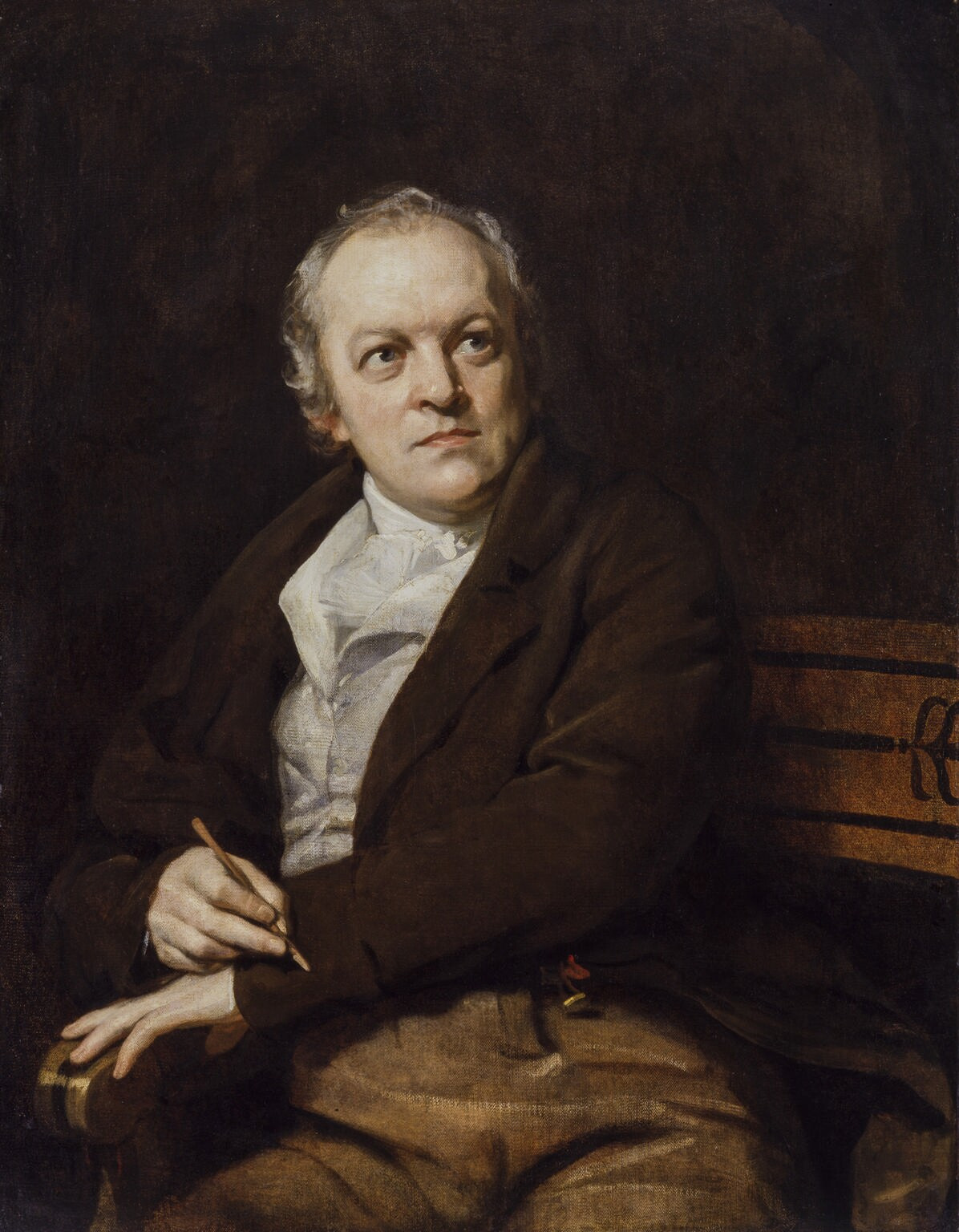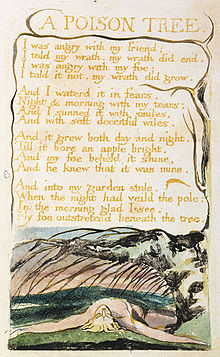Analysis: 'A Poison Tree' by William Blake
 A while ago we read Paradise Lost at university and discussed all things sin and Fall related. A poem that popped up was William Blake's 'A Poison Tree', which not only discusses the nature of anger but also contains some very strong allusions to the Fall of Man. I have copied the poem from Poetry Foundation (a great source for poetry) and below that is an analysis of Blake's poem. But first, why would William Blake be likely to write about anything sin related?
A while ago we read Paradise Lost at university and discussed all things sin and Fall related. A poem that popped up was William Blake's 'A Poison Tree', which not only discusses the nature of anger but also contains some very strong allusions to the Fall of Man. I have copied the poem from Poetry Foundation (a great source for poetry) and below that is an analysis of Blake's poem. But first, why would William Blake be likely to write about anything sin related?According to some, Blake was one of the most important poets and authors in the development of English literature, especially considering how little he is read by the masses. Although he attacked the institution of religion (and the way it prescribes people to restrain themselves) quite severely during his life-time, he was by no means irreligious or atheistic. He was opposed to seeing the body and soul as two separate things because, he argued, it led to an unnatural restraint of human urges. Jesus was a key figure for him, since he united divinity and humanity. In the title his collection of poetry called Songs of Innocence and Experience Blake was echoing the Miltonic ideas of Paradise and the Fall. Paradise is a state of innocence in which humanity is still pre-sin, much like during childhood, whereas experience of the "real world" is what leads to corruption and sin. It should come as no surprise, then, that 'A Poison Tree' is to be found in the 'Experience'-part of the book.
'A Poison Tree' - William Blake
 |
| Blake's relief etch for this poem. |
I was angry with my friend:
I told my wrath, my wrath did end.
I was angry with my foe:
I told it not, my wrath did grow.
And I watered it in fears,
Night and morning with my tears;
And I sunned it with smiles,
And with soft deceitful wiles.
And it grew both day and night,
Till it bore an apple bright.
And my foe beheld it shine.
And he knew that it was mine,
And into my garden stole
When the night had veiled the pole:
In the morning glad I see
My foe outstretched beneath the tree.
The first stanza seems very straightforward, presenting the reader with two different scenarios. In the one, an argument has broken out between the narrator and his friend, which is brought to an end by them talking it over. In the second, the narrator and his foe have and argument which they allow to grow by not talking about it. As I said, it seems straightforward, but Blake uses end-rhyme to really drive the message home. As you can see, 'friend' and 'end', both at the end of their respective lines, rhyme, and similarly do 'foe' and 'grow'. Blake suggests that in their very nature the two roles, friend and foe, encapsulate the possibility for conflict to end or grow. In this case, especially the link between 'foe' and 'grow' is important, since Blake continues to work upon that metaphor.
Also interesting is the fact that the narrator speaks of his 'wrath' as something almost separate of himself. It is the anger itself which seems to respond to his decision to speak of it or not and although the narrator does claim it for himself by using the possessive pronoun 'my' there is still the sense that this 'wrath' has a presence of its own. As mentioned above, his aversion to the repression of feelings comes through very strongly here. The repression of anger is what leads to it becoming something that is almost impossible to control.
_-_Adam_and_Eve-Paradise_-_Kunsthistorisches_Museum_-_Detail_Tree_of_Knowledge.jpg) |
| Lucas Cranach the Elder's painting titled 'The Fall of Man'. |
In the third stanza the 'wrath' has officially become a separate entity that 'bore an apple bright'. Part of Swedeborg's theory was that when one becomes disassociated with one's own identity, you can't see evil for evil. The fact that this apple of maliciousness appears 'bright' to the narrator shows that he has, in some ways, lost sight of what is right and good. However, it also 'shines' to the narrator's 'foe', suggesting he is equally deluded. Also, the mere mention of apple naturally has to lead to the discussion of the apple of the Tree of Knowledge which caused Adam and Eve to be evicted from Eden. The hidden nature of the narrator's 'wrath' is clearly a kind of deceit, the tool used by Satan to convince Eve to eat from the Tree. The apple here clearly links the poem with the tradition of the Fall, suggesting that the repression of emotions causes sin, rather than prevents it.
Whereas the first two stanzas were self-contained, in the sense that both ended on a full stop, the sentence started in line 12 continues on in stanza four. This link between something belonging to the narrator and the foe stealing into his garden is interesting. It suggests a continuing sense of resentment over the potential cause of the 'wrath' from stanza one, but it also shows the narrator's eagerness to continue. The trochaic beat of the poem also seems to urge the reader to speed up his reading, giving him the sense that there is something sneaky and covert about the poem, as if the narrator is trying to cover something up. Clearly Blake used this effect in order to continue driving the idea of repression home.
Although the eating of the apple isn't shown, it is clear that it is the foe's desire for the apple that has lead to him being 'outstretched beneath the tree'. Not only has the whole poem hastened towards this end, but he himself, under the cover of the 'veiled' stars, snuck towards the tree. The suppressed anger has not only lead to the death of one, but to the moral corruption of the other. Interesting is that Blake seems to pass no judgement upon the narrator for his lack of emotion when it comes to this death. Whether this is because he blames the general idea of repression or for a different I don't know, but one thing is sure. This poem can be the beginning of very interesting conversations.
Do you like 'A Poison Tree'? If you like Blake, definitely have a look at some of his relief etchings because they are stunning!



sounds like he poisoned an apple and gave it to snow white... but that's just literally speaking for me
ReplyDeleteThanks for sharing such a nice content. Your post was really good. Some ideas can be made. About English literature. Further, you can access this site to learn more about William Blake Precursor of Romantic Poetry
ReplyDeleteVery details and informative article and very helpful English literature students
ReplyDeleteYour post is very good
DeleteIt is very beautiful for my study. Some idea can be made in this poem. It is very details and informative. Many things added in it
DeleteThis poem beautifully captures the destructive power of harboring anger and resentment. It serves as a reminder to communicate openly rather than letting emotions fester and grow poisonous.
ReplyDeleteThis is such an incredibly poem.This poison tree poem gives many information to me.In this poem each line is a journey. Thanks for giving this poem.
ReplyDeletehank you so much for most of all what I learned from it
ReplyDelete